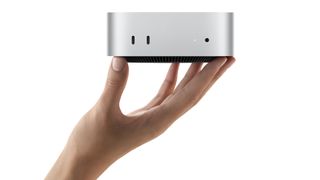Apple is once again taking the mini name to heart, unveiling today an all-new, almost impossibly tiny Mac mini running not only a 3-nanometer M4 chip but with the option of an all-new piece of Apple silicon, the M4 Pro.
When Apple introduced the Mac mini almost a decade ago, it was the smallest Mac to date, at just 6.5 inches x 6.5 inches and 2 inches tall. Recent editions have grown to almost 8 inches square, making them feel less like tiny computers and a bit more like elegant hot plates. This new model clocks in at 5.5 inches square and perhaps a bit taller than the M2 model. That's still about two inches larger than an Apple TV 4K but also small enough to fit in one decent-sized hand.
At a glance, the Mac mini M4 is familiar. It's still made of recycled aluminum (though 85% less than the last model), is still square with rounded corners, and has a circular fan vent in the base. After that, the pint-sized computer diverges. The once-clean face now offers a pair of USB-C ports and a 3.5mm headphone jack. One might argue that the smaller chassis forced the movement of some ports from the back to the front, but I think people will welcome the ease of use.
You'll find the more familiar Thunderbolt (3x), Ethernet, and HDMI ports on the back.

What may matter most to Mac mini fans is the introduction of Apple's newest and fastest silicon, the M4, first seen in the iPad Pro. The last Mac mini topped out at an M2 class chip, offering performance options up to the M2 Pro. In a similar fashion, the new Mac mini marks the introduction of the M4's first iteration: an M4 Pro.
The M4 Pro brings with it an up-to-14-core CPU and an up-to-20-core GPU. It matches the M4's 16-core neural engine, which plays a large role in AI operations. One of the big changes, and one that could significantly impact performance, is the increased memory bandwidth. While the M2 Pro offers 120Gbps throughput, the M4 Pro promises 75% higher memory bandwidth.
Again, we won't know the true impact until we test the new Mac mini and its new CPU.
The new Pro-level silicon also introduces Thunderbolt 5 support, which means those ports will offer transfer speeds of up to 120Gbps, a tantalizing prospect for those who work in pro-level video editing.
Tiny and neutral
Apple is calling this its first carbon-neutral Mac because, in addition to that far reduced use of aluminum, the product features 50% recycled content and is being produced using all renewable energy.
Like other Apple silicon-running systems, the new Mac mini M4 offers full support for Apple intelligence. Perhaps that's why the new base memory for all Mac minis is now 16GB, up from 8GB. Though, you can get up to 64GB of RAM when you have the M4 Pro chip in a Mac mini.
Apple is doing that while keeping the base price at $599 / £599 / $999AU. It's a welcome change, even if it's partially necessitated by Apple Intelligence's onboard generative AI processing demands.

While I have yet to test the new M4 Pro Mac mini, I have seen it in action running, for instance, an application known as Aperty that lets you do pro-level portrait photography editing.
In one demo, I watched as they added new point lighting to a photo and then dragged it around as the subject's lighting changed in real-time. The system appeared to instantly assess the 3D contours of the face, apply an invisible map, and adjust the virtual light accordingly. It can do this work and other onboard AI actions – powered mainly by the Neural Engine – that can instantly add or change makeup and remove under-eye shadows.
The new Mac mini M4 is on pre-sale today (Oct. 29) and ships on November 8 with a starting price of $599 / £599 / $999AU. The base model starts with a 10-core CPU and 10-core GPU, 16GB of memory, and 256GB of storage. It ranges up to $1,399 / £1399 / $2,199AU for a Mac mini M4 packed with a 12-core CPU, 16 Core GPU, 24GB of memory, and 512GB of storage.










 English (US) ·
English (US) ·